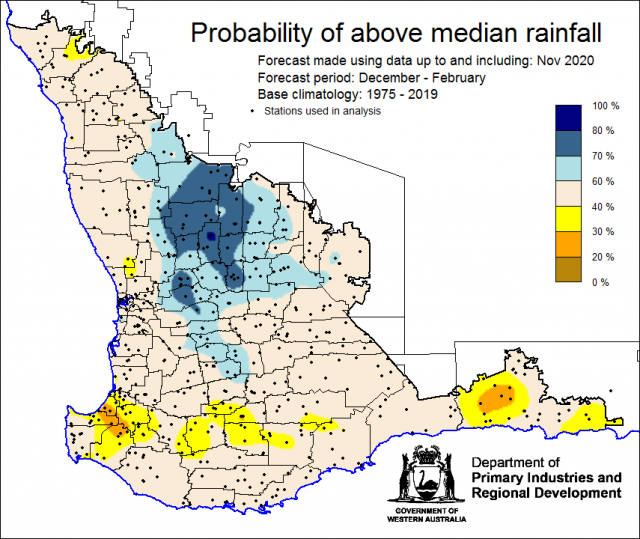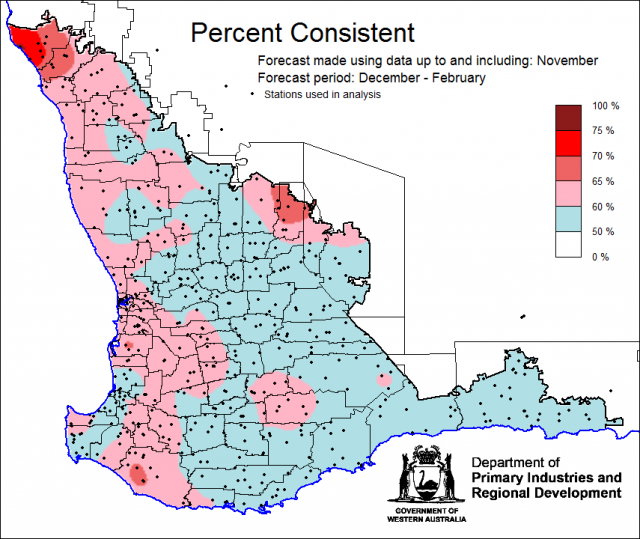Summary
The Department of Primary Industries and Regional Development’s (DPIRD) Statistical Seasonal Forecast (SSF) outlook for summer, December 2020 to February 2021 is indicating neutral (40-60%) chance of exceeding median rainfall for the majority of the South West Land Division.
- For summer, December 2020 to February 2021, the SSF is indicating neutral (40-60%) chance of exceeding median rainfall for the majority of the South West Land Division (SWLD). With higher chances (60-80%) for the Central Wheatbelt forecast District. The most probable rainfall decile map indicates decile 8-10 for the Central Wheatbelt District, 2-3 for South East Coastal District and decile 4-7 elsewhere in the SWLD. Predictive skill based on November conditions is mostly poor to moderate (50-75% consistent).
- The Bureau of Meteorology’s seasonal outlook for summer, December 2020 to February 2021 is indicating 65-75% of exceeding median rainfall for the majority of the SWLD. Predictive skill is poor to good (45-75% consistent). The longer-term outlook for January to March is similar. Predictive skill is moderate to good (55-75%).
- Temperature outlooks for summer, December 2020 to February 2021, from the Bureau indicate a 60-80% chance of above average day-time maxima along the west coast, with lower chances (less than 40%) for the south coast and interior (high skill 75-100%) and 80% chance of above average night-time minima (high skill 75-100%) for the SWLD.
- November rainfall was highest on record for Perth and seventh highest for Western Australia due to a series of strong cold fronts. November maximum temperatures were below average to average and minimum temperatures were generally average.
- The La Niña in the tropical Pacific Ocean, together with a positive SAM are currently the main climate drivers influencing SWLD climate. In a La Niña, there is an increased chance of above average number of tropical systems (cyclones and lows) across northern Australia. This may lead to more summer rainfall in the SWLD. A positive SAM means westerly winds are further south than normal and this may increase temperatures in the SWLD.
Three Month Seasonal Outlook for the South West Land Division
Statistical Seasonal Forecasting (SSF)
DPIRD’s Statistical Seasonal Forecast (SSF) system uses historical relationships between global sea surface temperature and sea level pressure with rainfall in south-west Australia to produce forecasts of rainfall for the coming months. Users can click on any station indicated on the map for location-specific forecast information from the Seasonal Climate Information web page.
For summer, December 2020 to February 2021, the SSF is indicating neutral (40-60%) chance of exceeding median rainfall for the majority of the South West Land Division (SWLD). With higher chances (60-80%) for the Central Wheatbelt forecast District. The most probable rainfall decile map indicates decile 8-10 for the Central Wheatbelt District, 2-3 for South East Coastal District and decile 4-7 elsewhere in the SWLD. Predictive skill based on November conditions is mostly poor to moderate (50-75% consistent).


